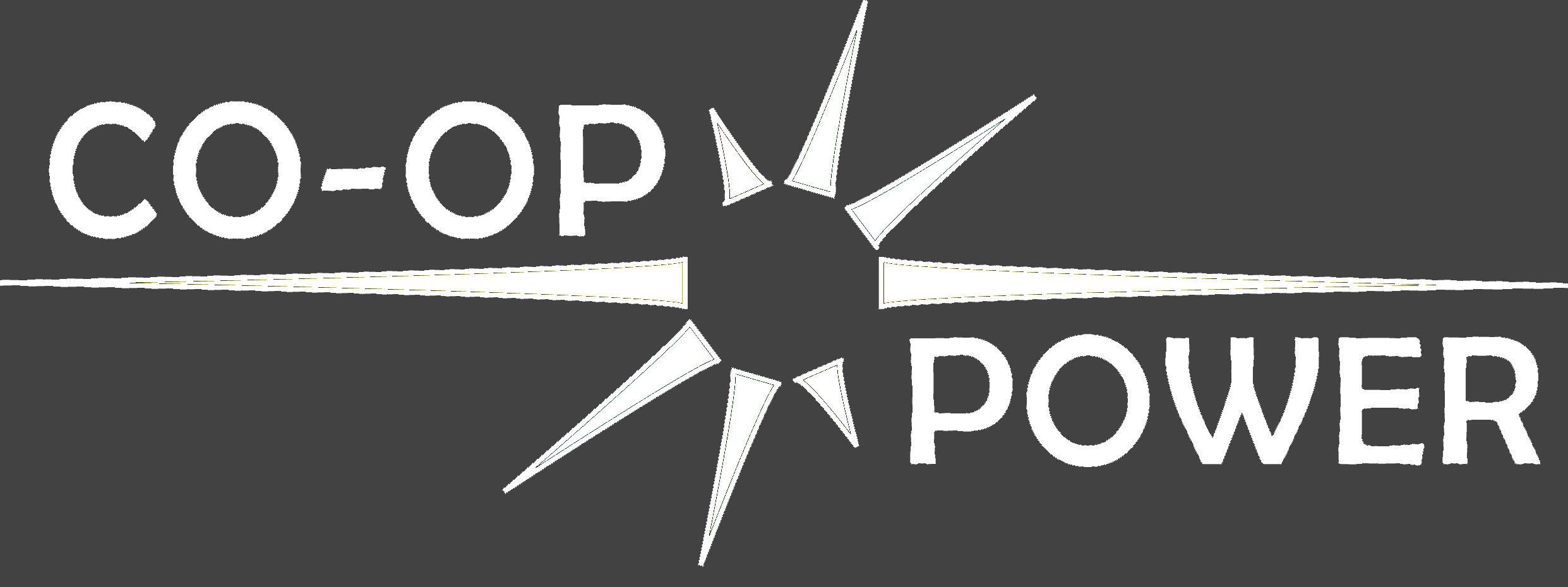Community Energy Co-ops
In 2009 Co-op Power Members adopted our regional structure, organizing our cooperative as a decentralized network of Community Energy Co-ops (CEC). These Co-ops are self-organizing. They set their own agenda based on local energy priorities. They raise capital from their members and invest it in their own local energy projects. They organize their own buying groups, contracting with local vendors to bring them the energy resources they need.
Co-op Power, as a decentralized network of local organizations, has Community Energy Co-ops each playing the lead role in their regions. Their primary responsibility is to organize and educate people in their region and to facilitate the development of one or more community-owned, community-scale, clean energy businesses. Each Community Energy Co-op has one member serve on the Co-op Power board. Each representative has veto power and can stop something within specific guidelines. In this way, locals work autonomously, yet in coordination with each other.
Current Community Energy Co-ops include:
CEC's are led by Steering Committees elected by the members in any self-defined region. Steering Committees function as sub-committees of the Board of Directors. Community Organizing Co-ops can be formed by any group of 20 Co-op Power members who are committed to the mission and who agree to carry out the responsibilities of a CEC:
Outreach and Membership Development
Education
Participatory Clean Energy Community Planning
Public Policy Advocacy
Local Clean Energy Project Development
Create Buying Groups for creation and distribution of Co-op Power products
and provision for free Co-op Power office space in a central location
Instructions on founding a Community Energy Co-op
Here are some of the important opportunities that Local Councils might want to take advantage of:
Biodiesel and Heating Oil Buying Groups - Since the biodiesel plant will likely be up and running this summer, CECs have more leverage in forming heating oil and transportation fuel buying groups this year. Let Mark Skinder (mark@cooppower.coop) know if your CEC would like to host a Biodiesel Heating Oil and/or Transportation fuel buying group this year.
Community Solar - Many Co-op Power members joined in order to purchase clean electricity. We now have the infrastructure developed for Co-op Power to own large solar arrays and apply the electricity produced to our members' electric accounts. It's a good time to do this now and offers a much better alternative than having our solar power owned by large companies with head offices far away. Let Mark (mark@cooppower.coop) know if you'd like to start up a Community Solar project.
Energy Efficiency - Start an Energy Awareness Campaign in your neighborhood that helps people learn about their homes, how energy moves in them, what they can do to reduce their energy use and use energy more wisely. Bring in Co-op Power's highly skilled energy efficiency staff or preferred vendors in your region to help you teach people about these important issues and to upgrade their homes. Let Mark (mark@cooppower.coop) know if you'd like to launch an Energy Awareness Campaign.
Community Energy Business Development - Work with Co-op Power staff to launch a participatory planning process in your region to figure out what green jobs and what green products and services you need most. Once you decide on the best option, work with Co-op Power staff to conduct business planning, recruit member equity, raise community capital, train local people to work in your business, and launch the business. Co-op Power has already helped launch Energia in Holyoke, Northeast Biodiesel in Greenfield, five solar installation businesses, two green electricians, and one thermal window insert business. Let Lynn Benander ( lynn@cooppower.coop) know if you're ready to take on a big project.



